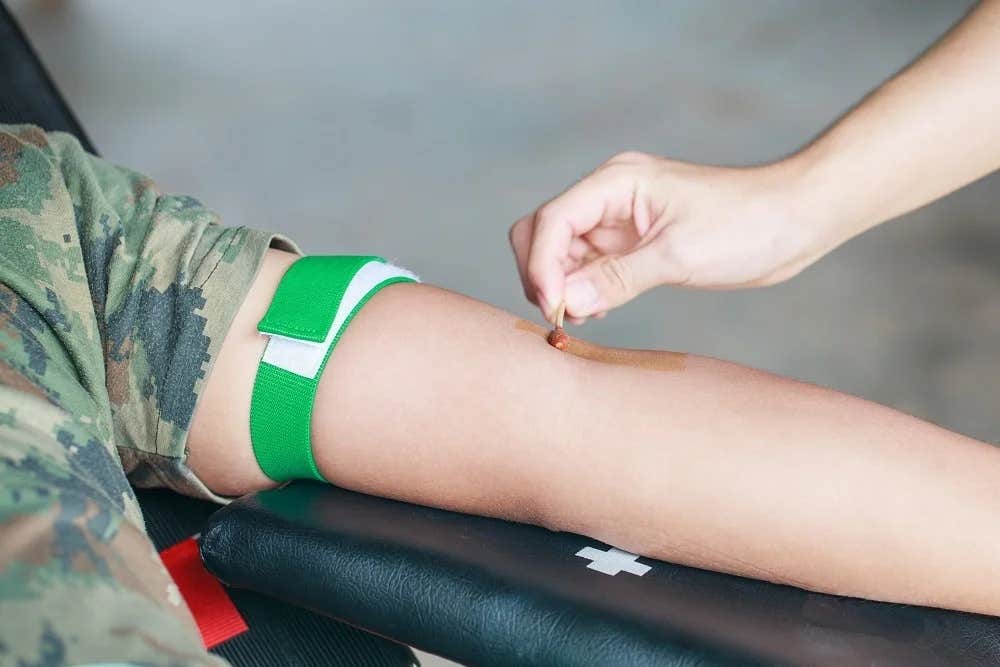Simple blood tests could aid PTSD diagnosis, treatment and prevention
Approx. 3.6% of U.S. adults experience PTSD in any given year, and about 7% of people will experience PTSD at some point in their lives.

[Mar. 29, 2023: JJ Shavit, The Brighter Side of News]
Approximately 3.6% of U.S. adults experience PTSD in any given year, and about 7% of the population will experience PTSD at some point in their lives. (CREDIT: Creative Commons)
Post-traumatic stress disorder (PTSD) is a serious mental health condition that can occur after experiencing or witnessing a traumatic event. According to the National Institute of Mental Health, approximately 3.6% of U.S. adults experience PTSD in any given year, and about 7% of the population will experience PTSD at some point in their lives.
However, diagnosing and treating PTSD can be challenging, as symptoms such as flashbacks, difficulty sleeping or concentrating, negative thoughts, memory problems, and avoidance of triggering situations can also occur in other mental health conditions.
Now, a new study involving over 1,000 service members has identified four biomarkers that could be used to predict a person's likelihood of developing PTSD, diagnose the disorder, or monitor the response to treatment.
The study, which represents the largest prospective study to date to assess the biological markers of PTSD over time, was conducted by researchers at the Walter Reed Army Institute of Research in Silver Spring, Maryland.
Related Stories:
“This study provides valuable insights into the natural history of PTSD and the effectiveness of interventions, which can inform the development of treatment guidelines and improve the care for individuals suffering from PTSD,” said Stacy-Ann Miller, a researcher at the Walter Reed Army Institute of Research.
“Better methods of predicting or screening for PTSD could help to overcome the disorder by identifying individuals at high risk of developing PTSD and providing them with early intervention or prevention strategies. This could potentially reduce the severity of symptoms or prevent the disorder from developing altogether.”
The four biomarkers identified in the study can be measured with a simple blood test and have previously been linked to stress, depression, anxiety, and mental health disorders. They include:
The glycolytic ratio, a measure of how the body breaks down sugar to produce energy
Arginine, an amino acid that plays a role in the immune and cardiovascular systems
Serotonin, a chemical messenger that helps regulate mood, sleep, and other functions
Glutamate, a chemical messenger that plays a role in learning and memory.
The researchers analyzed these biomarkers in blood samples from active-duty service members taken before a 10-month deployment, three days after their return, and three to six months after their return. Participants were classified as having PTSD, sub-threshold PTSD, or no PTSD based on their clinical diagnosis and PTSD symptoms.
Researchers also classified participants' resilience based on a combination of factors, including PTSD, anxiety, sleep quality, alcohol use disorders, combat exposures, traumatic brain injury, and general physical and mental health.
Comparing these biomarkers in people with different PTSD status and levels of resilience, the results showed that those with PTSD or sub-threshold PTSD had significantly higher glycolytic ratio and lower arginine than those with high resilience.
People with PTSD also had significantly lower serotonin and higher glutamate than those with high resilience. These associations were independent of factors such as gender, age, body mass index, smoking, and caffeine consumption.
The researchers believe that these biomarkers could help predict which individuals are at high risk of developing PTSD, improve the accuracy of PTSD diagnosis, and improve overall understanding of the drivers and effects of PTSD.
"Improved methods of screening and predicting PTSD could inform better treatment approaches by providing a deeper understanding of the underlying biological mechanisms of the disorder," said Miller. "This could lead to the development of more targeted and effective treatments for PTSD or to identify specific subtypes of PTSD, which may respond differently to different treatments."
However, the researchers caution that more research and validation would be needed to confirm the biomarkers' utility in real-world settings.
The findings of this study have been presented at Discover BMB, the annual meeting of the American Society for Biochemistry and Molecular Biology.
The research was conducted in collaboration with the PTSD Systems Biology Consortium, a network of government and academic laboratories. Collaborators include Aarti Gautam, Ruoting Yang, Seid Muhie, Marti Jett and Rasha Hammamieh of the Walter Reed Army Institute of Research; Inyoul Lee, Kai Wang and Leroy Hood of the Institute for Systems Biology; Charles Marmar of New York University Langone Medical Center; Rachel Yehuda and Janine Florey of the Icahn School of Medicine at Mount Sinai; Synthia H. Mellon and Owen M. Wolkowitz of the University of California, San Francisco; Kerry Ressler and Francis J. Doyle III of Harvard University; and Bernie Daigle of the University of Memphis.
Note: Materials provided above by The Brighter Side of News. Content may be edited for style and length.
Like these kind of feel good stories? Get the Brighter Side of News' newsletter.
Joseph Shavit
Head Science News Writer | Communicating Innovation & Discovery
Based in Los Angeles, Joseph Shavit is an accomplished science journalist, head science news writer and co-founder at The Brighter Side of News, where he translates cutting-edge discoveries into compelling stories for a broad audience. With a strong background spanning science, business, product management, media leadership, and entrepreneurship, Joseph brings a unique perspective to science communication. His expertise allows him to uncover the intersection of technological advancements and market potential, shedding light on how groundbreaking research evolves into transformative products and industries.



